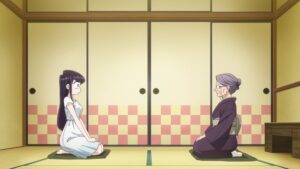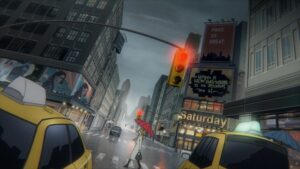Komi-san wa, Komyushou desu – 8
Wooper: This episode peaked early, as its funniest gag arrived just before the OP kicked in. It’s pictured above on the left – the “?!” represents the confusion of Komi’s ancestors at her claim that they’d had a nice graveside chat. In reality, she’s so awkward that even her internal dialogue earned a silent “…” when visualized on screen, which means even dead people are more expressive than poor Komi. That lack of expressiveness continued with diverse results, as she was able to play a board game with her cousin for the first time, and even got out a full (if fragmented) sentence to Tadano during their time at the Bon festival. It’s interesting to note that while a lot of anime treat matsuri as climactic events, Komi-san inserted its festival into the middle segment in one of its middle episodes. That’s probably an indicator that it’s on a different schedule than most romcoms, which typically aim for a confession at a fateful moment in their finales. Komi-san is on another sort of journey, it seems: pushing its heroine to the point where she’s comfortable around others (not just the guy she likes). I can appreciate that mission, just as I appreciated the perfect deployment of side characters Yadano and Nakanaka in this episode. Each girl had a tiny appearance at just one booth during the festivities, both of which made the most of their competitiveness and delusion, respectively. A fine episode on the whole, even if its sappy final segment was a bit much for me.
Star Wars: Visions – 8
Wooper: “Lop and Ocho” is probably the most visually ambitious episode in the Star Wars: Visions anthology, though it doesn’t always deliver on that ambition. There’s a series of swooping zooms and flyover shots during the opening narration that give the planet Tao a lot of character, with rock formations and forests giving way to an early modern city. As the story progresses, highly-detailed backgrounds depict merchants’ alleys, underground shrines, and traditional Japanese homes with a painted art style reminiscent of top shelf theatrical anime. But despite the quality of these images, the scenes which they create often feel sterile, as unmoving oceans and frozen background characters fail to make the beautiful artwork come alive. If not for that source of disappointment, I could have overlooked the other ways in which this episode fell short, mostly in the story department. The conflict between two adoptive sisters Lop and Ocho resulted in a fabulous lightsaber duel, but their reason for fighting was unclear, and the seven year timeskip between their first meeting and Ocho’s subsequent betrayal made their relationship impossible to care about. I probably sound like a broken record in criticizing Visions’ wispy plots week after week, but trust me, this one was especially thin – the abundance of “It wasn’t supposed to be this way!” dialogue during its final act is evidence of that.
Super Crooks – 5-7
Wooper: After seven episodes, I’d characterize Super Crooks as a scattershot series. There are a lot of ideas at play here, but most viewers will only enjoy some of them – that’s certainly the case for me, as the stuff I like is often isolated from the larger story. The show recently attracted some attention for its animation of a supervillain (Roddy Diesel) reconstructing his arm from the bone up, but neither that scene nor the rest of Roddy’s fight on top of the transport plane held much appeal for me. His character, along with the majority of the villains recruited by Carmine for their upcoming heist, is too easily grasped: violent, temperamental, entirely defined by his superpower. It was only TK, the telekinesis user who they rescued from the plane in episode 6, who caught my interest due to his history with Johnny. Their shared time in prison and his story about applauding a guard who had committed murder created the impression that he was superficially villainous rather than wholly corrupt. Forecast’s easygoing personality and unique ability have me curious about his role in the show’s next caper, as well, but my curiosity often gives way to boredom when the show takes too long to explain (or not explain, as when Carmine’s dialogue is drowned out by diegetic noise) those capers. Prioritize relationships between characters, not protracted info dumps or dull insults – that’s my hope for the next batch of episodes.







Regarding Super Crooks, if you were hoping that things are going to come together sooner than later, then you’re not going to get that until the last 3 episodes, which is where the actual comic source material is adapted. That’s right, not even anime is safe from the Netflix Bloat.